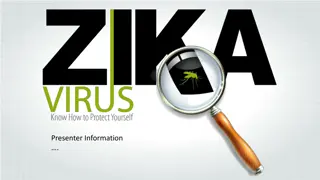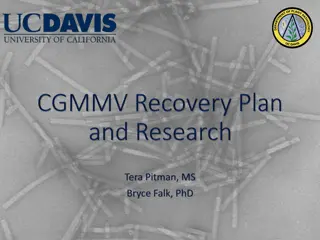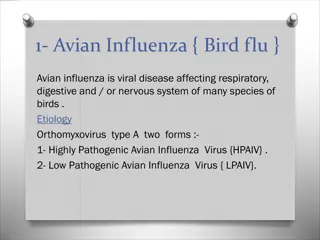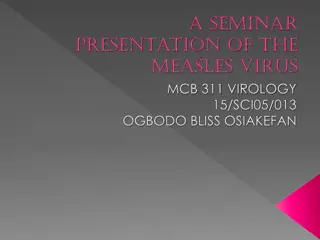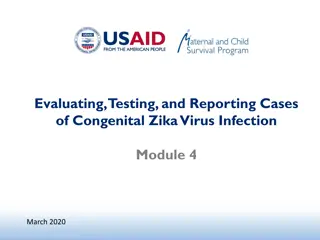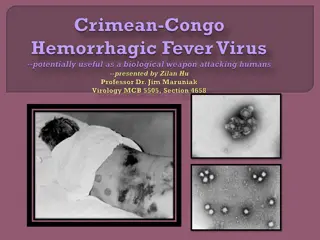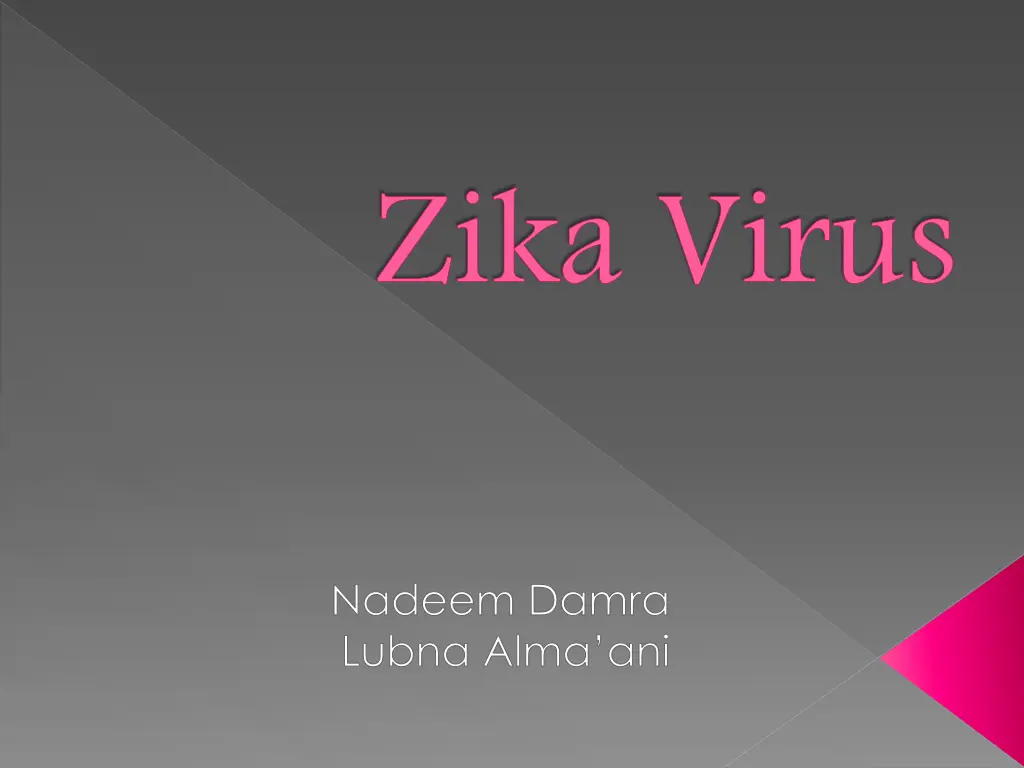
Understanding Zika Virus: Symptoms, Transmission, and Prevention
Learn about the Zika virus, its symptoms, transmission, and prevention methods in this comprehensive overview. Find out how this virus can impact health, especially during pregnancy, and what measures can be taken to reduce the risk of infection.
Download Presentation

Please find below an Image/Link to download the presentation.
The content on the website is provided AS IS for your information and personal use only. It may not be sold, licensed, or shared on other websites without obtaining consent from the author. If you encounter any issues during the download, it is possible that the publisher has removed the file from their server.
You are allowed to download the files provided on this website for personal or commercial use, subject to the condition that they are used lawfully. All files are the property of their respective owners.
The content on the website is provided AS IS for your information and personal use only. It may not be sold, licensed, or shared on other websites without obtaining consent from the author.
E N D
Presentation Transcript
Zika Virus Nadeem Damra Lubna Alma ani
Outline Objective Introduction Over view of zika virus Sign & Symptoms Complication Transmition Prevention Diagnosis Treatment WHO response Nursing role Summery conclusion Article Reference Objective Introduction Over view of zika virus Sign & Symptoms Complication Transmition Prevention Diagnosis Treatment WHO response Nursing role Summery conclusion Article Reference
Objectives At the end of this seminar student will be able to : 1. Demonstrate the definition of zika virus. 2. List at signs and symptoms for zika virus. 3. List the complications and transmission routes for zika virus. 4. Give at least 3 examples of prevention ways. 5. Recognize the diagnosis process of zika virus. 6. Recognize some recommendations about zika virus.
What is the zika virus ? Zika virus disease is caused by the Zika virus, which is spread to people primarily through the bite of an infected mosquito , The illness is usually mild with symptoms lasting up to a week, and many people do not have symptoms or will have only mild symptoms. However, Zika virus infection during pregnancy can cause a serious birth defect called microcephaly and other severe brain defects.
Overview of zika virus Zika virus disease is caused by a virus. The virus is known to circulate in Africa , the Americans, Asia and pacific. The first case of zika was in monkey in the zika forest in Uganda in 1947. The first human case were reported in Nigeria in 1954 a few outbreaks have been reported in tropical Africa and some areas in south east Asia. In may 2015 the American health origination an alert the first confirmed zika virus in brazil and it cause of 2.400 of microcephaly and 29 infant death in brazil in 2015
Sign and symptom Many people infected with Zika virus won t have symptoms or will only have mild symptoms. Symptoms can last for several days to a week. People usually don t get sick enough to go to the hospital, and they very rarely die of zika. The most common symptoms of Zika are : Fever Rash Joint pain Conjunctivitis (red eyes) Other symptoms include: Muscle pain Headache
Complication Serious complications and deaths from Zika are not comm. However, based on a growing body of research there is scientific consensus that Zika virus is a cause 1. microcephaly 2. Guillain-Barr syndrome 3. acute disseminated encephalomyelitis 4. encephalopathy
Transmission 1. Through mosquito bites Mosquitoes become infected when they feed on a person already infected with the virus. Infected mosquitoes can then spread the virus to other people through bites
2. From mother to child A pregnant woman can pass Zika virus to her fetus during pregnancy. Zika is a cause of microcephaly and other severe fetal brain defects. We are studying the full range of other potential health problems that Zika virus infection during pregnancy may cause. To date, there are no reports of infants getting Zika virus through breastfeeding. Because of the benefits of breastfeeding, mothers are encouraged to breastfeed even in areas where Zika virus is found
3. Through sex Zika can be passed through sex from a person who has Zika to his or her partners that Zika can remain in semen longer than in other body fluids, including vaginal fluids, urine, and blood
4. Through blood transfusion To date, there have not been any confirmed blood transfusion transmission cases in the United States. There have been multiple reports of blood transfusion transmission cases in Brazil. These reports are currently being investigated.
Prevention No vaccine exists to prevent Zika. Prevent Zika by avoiding mosquito bites. Mosquitoes that spread Zika virus bite during the day and night. Mosquitoes that spread Zika virus also spread dengue and chikungunya viruses. Zika can be passed through sex from a person who has Zika to his or her sex partners. Condoms can reduce the chance of getting Zika from sex. Condoms include male and female condoms. Local mosquito-borne Zika virus transmission has been reported in the continental United States.
Diagnosis Infection with Zika virus may be suspected based on symptoms and recent history of travel (e.g. residence in or travel to an area with active Zika virus transmission). A diagnosis of Zika virus infection can only be confirmed through laboratory tests on blood or other body fluids, such as urine, saliva or semen.
Diagnosis Ultrasound may show finding consist with fetal microcephaly or intracranial calcification
Treatment Zika virus disease is usually mild and requires no specific treatment. People sick with Zika virus should get plenty of rest, drink enough fluids, and treat pain and fever with common medicines. If symptoms worsen, they should seek medical care and advice. There is currently no vaccine available.
WHO response WHO is supporting countries to control Zika virus disease by taking actions outlined in the Zika Strategic Response Framework": Define and prioritize research into Zika virus disease by convening experts and partners. Enhance surveillance of Zika virus and potential complications. Strengthen capacity in risk communication to engage communities to better understand risks associated with Zika virus. Strengthen the capacity of laboratories to detect the virus. Support health authorities to implement vector control strategies aimed at reducing Aedes mosquito populations. Prepare recommendations for the clinical care and follow-up of people with complications related to Zika virus infection, in collaboration with experts and other health agencies.
WHO RESPONSE During outbreaks, space spraying of insecticides may be carried out following the technical orientation provided by WHO to kill flying mosquitoes. Suitable insecticides (recommended by the WHO Pesticide Evaluation Scheme) may also be used as larvicides to treat relatively large water containers, when this is technically indicated.
Role of community nursing health care All patients (male and female) with Zika virus infection and their sexual partners (particularly pregnant women) should receive information about the potential risks of sexual transmission of Zika virus, contraceptive measures and safer sexual practices, and should be provided with condoms when feasible. Women who have had unprotected sex and do not wish to become pregnant because of concern with infection with Zika virus should also have ready access to emergency contraceptive services and counselling.
Nursing role Sexual partners of pregnant women, living in or returning from areas where local transmission of Zika virus is known to occur, should use safer sexual practices or abstinence from sexual activity for the duration of the pregnancy. As most Zika virus infections are asymptomatic: Men and women living in areas where local transmission of Zika virus is known to occur should consider adopting safer sexual practices or abstaining from sexual activity. Men and women returning from areas where local transmission of Zika virus is known to occur should adopt safer sexual practices or consider abstinence for at least four weeks after return.
Nursing role In pregnant women with laboratory evidence of Zika virus infection, fetal growth and anatomy should be monitored via serial ultrasounds. Referral to a maternal-fetal medicine or infectious disease specialist is recommended.
Nursing role Basic precautions for protection from mosquito bites should be taken by people traveling to high risk areas, especially pregnant women. These include use of repellents, wearing light colored, long sleeved shirts and pants and ensuring rooms are fitted with screens to prevent mosquitoes from entering.
Summery Zika virus disease is caused by a virus transmitted primarily by Aedes mosquitoes. People with Zika virus disease can have symptoms including mild fever, skin rash, conjunctivitis, muscle and joint pain, malaise or headache. These symptoms normally last for 2-7 days. There is scientific consensus that Zika virus is a cause of microcephaly and Guillain-Barr syndrome. Links to other neurological complications are also being investigated.
Conclusion Zika virus is considered an emerging infectious disease with the potential spreading to new areas where the aedes mosquito vector is present .. Considering that scientists have a limited yet rapidly increasing knowledge about the epidemiology , transmission , transport overseas , and sign & symptoms related to the virus . Mosquito-breeding places is an important factor in the risk of infection Zika virus factors. And based disease prevention and control to reduce the number of mosquitoes by reducing sources (remove breeding places and adjusted) and reduce people's exposure to mosquitoes.
Reference http://www.who.int/mediacentre/factshe ets/zika/en/ http://www.cdc.gov/zika/index.html https://en.wikipedia.org/wiki/Zika_virus










